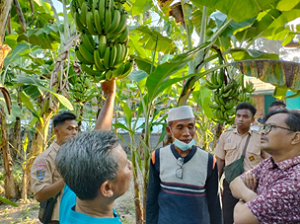Peningkatan Kemandirian Ekonomi Pesantren Berbasis Agribisnis di Lingkungan Pondok Pesantren Raudhatus Salaam Berbah – Sleman Improving the Economic Independence of Pesantren based on Agribusiness in the Raudhatus Salaam Islamic Boarding School Environment Berbah – Sleman
Main Article Content
Abstract
Raudhatus Salaam Islamic Boarding School Berbah Sleman Regency's operating costs are still heavily reliant on student fees and donations from donors, but it has three vacant waqf land locations that have yet to be developed to support pesantren's economic independence. The goal of this Community Partnership Program is to initiate efforts to increase the economic independence of pesantren through agribusiness-based activities by optimizing the existing resources. The data collection method used in this activity is observation and focus group discussion, while the method of service implementation is through counseling, land clearing, planting, and post-planting maintenance. The study's data were analyzed quantitatively and qualitatively. This program has been successful in increasing the empowerment of partners in terms of knowledge and skills, with the goal of increasing the economic independence of the partners' pesantren by converting one of the existing lands into a banana plantation.
Downloads
Article Details

This work is licensed under a Creative Commons Attribution-ShareAlike 4.0 International License.
Authors who publish with this journal agree to the following terms:
- Any article on the copyright is retained by the author(s).
- Author grant the journal, right of first publication with the work simultaneously licensed under a Creative Commons Attribution License that allows others to share work with acknowledgment of the work authors and initial publications in this journal.
- Authors are able to enter into a separate, additional contractual arrangements for non-exclusive distribution of published articles of work (eg, post-institutional repository) or publish it in a book, with acknowledgment of its initial publication in this journal.
- Authors are permitted and encouraged to post their work online (e.g., in institutional repositories or on their websites) prior to and during the submission process, as can lead to productive exchanges, as well as earlier and greater citation of published work.
- The article and any associated published material is distributed under the Creative Commons Attribution-ShareAlike 4.0 International License
References
Afiyanti, Y. (2008). Focus Group Discussion (Diskusi Kelompok Terfokus) sebagai Metode Pengumpulan Data Penelitian Kualitatif. Jurnal Keperawatan Indonesia, 12(1), 58-62. https://doi.org/10.7454/jki.v12i1.201
Ahada, N. & Zuhri, A. F. (2020). Menjaga Kelestarian Hutan dan Sikap Cinta Lingkungan bagi Peserta Didik MI/SD di Indonesia. El Banar: Jurnal Pendidikan dan Pengajaran, 3(1), 35-46. https://doi.org/10.54125/elbanar.v3i1.43
Bina, O. (2013). The Green Economy and Sustainable Development: An Uneasy Balance? Environment and Planning C: Government and Policy, 31(6), 1023-1104. https://doi.org/10.1068/c1310j
Dahang, D., Sinaga, R., & Sembiring, H.A. (2022). Komparasi Budidaya Tanaman Pisang Barangan (Musa Acuminata Linn.) Secara Tradisional dan Modern di Desa Sukadame Kabupaten Deli Serdang. Jurnal Agroteknosains, 6(1),11-22. http://dx.doi.org/10.36764/ja.v6i1.752
Hamzah, A., Muchtar, R. P. M., & Sumitro, E. A. (2022). Potensi Peningkatan Produksi Pisang dalam Mendukung Kemandirian Pangan di Desa Gedang-Gedang Kecamatan Batuputih Kabupaten Sumenep. Journal of Food Technology and Agroindustry, 4(2), 74-89. https://doi.org/10.24929/jfta.v4i2.2125
Hanik, N. R., Harsono, S., & Nugroho, A. A. (2018). Penerapan Pendekatan Contextual Teaching and Learning dengan Metode Observasi untuk Meningkatkan Hasil Belajar pada Matakuliah Ekologi Dasar. Jurnal Pendidikan Matematika dan IPA, 9(2), 127-138. http://dx.doi.org/10.26418/jpmipa.v9i2.26772
Hendrickson, R. J., Hanson, J. D., Tanaka, D. L., & Sassenrath, G. (2008). Principles of Integrated Agricultural Systems: Introduction to Processes and Definition. Renewable Agriculture and Food Systems, 23(Special Issue 4), 265-271. https://dx.doi.org/10.1017/S1742170507001718
Ismail, S., Zahrudin, M., Ahmad, N., & Suhartini, A. (2020). Pembentukan Karakter Santri Melalui Panca Jiwa Pondok Pesantren. Dirāsāt: Jurnal Manajemen dan Pendidikan Islam, 6(2), 132-143. https://doi.org/10.26594/dirasat.v6i2.2205
Kumalawati, M. Yusuf, Z. et al., 2019. Karakter Pertumbuhan Tanaman Pisang Sebagai Penaung pada Pertanaman Kakao Lahan Bukaan Baru. Agroplantae J. Ilm. Terap. Budid. dan Pengelolaan Tanam. Pertan. dan Perkeb., vol. 8, no. 2, pp. 16–22, 2019, doi: 10.51978/AGRO.V8I2.69.
Mastuti, R. & Alfiansyah. (2016). Pengaruh Penerapan Sistem Agribisnis Terhadap Respon Petani pada Usaha Tani Kakao (Theobromacacao) di Kecamatan Rantau Kabupaten Aceh Tamiang. Jurnal Penelitian Agrisamudra, 3(1), 107-117.
Muliawati, E. S., Arniputri, R. B., & Priyatin, U. (2017). Pertumbuhan Bibit Pisang Pasca Aklimatisasi Dengan Sistem Hidroponik. Prosiding Seminar Nasional Fakultas Pertanian UNS, 1(1), 226-230.
Nashar. (2015). Prospek Jenis Tanaman Pisang untuk Dilakukan oleh Kelompok Usaha Tani. Iqtishadia: Jurnal Ekonomi Dan Perbankan Syariah, 2(1), 91-116. https://doi.org/10.19105/iqtishadia.v2i1.868
Purnomo, E., Pangarsa, N., Andri, K. B., & Saeri, M. (2015). Efektivitas Metode Penyuluhan Dalam Percepatan Transfer Teknologi Padi Di Jawa Timur. Jurnal Inovasi dan Teknologi Pembelajaran: Kajian dan Riset Dalam Teknologi Pembelajaran, 1(2),192-204. http://dx.doi.org/10.17977/um031v1i22015p191
Romdoni, L. N. & Malihah, E. (2020). Membangun Pendidikan Karakter Santri Melalui Panca Jiwa Pondok Pesantren. Jurnal Pendidikan Agama Islam Al-Thariqah, 5(2), 13-22. https://doi.org/10.25299/al-thariqah.2020.vol5(2).4808
Setiawan, W. L. (2020). Program One Pesantren One Product Dapat Menjadi Pendekatan Akselerasi Bisnis di Pesantren pada Masa Pandemi Covid-19. E-coops-day: Jurnal Ilmiah Abdimas, 1(2), 151-156. https://doi.org/10.32670/ecoopsday.v1i2.405%20for%20articles
Sirappa, M. P. (2021). Potensi Pengembangan Tanaman Pisang: Tinjauan Syarat Tumbuh dan Teknik Budidaya Pisang dengan Metode Bit. AgrosainT : Jurnal Ilmiah, 12(2), 54-65.
Soekartawi. (2007). E-Agribisnis: Teori dan Aplikasinya. Proceedings Seminar Nasional Aplikasi Teknologi Informasi, M19-M25.
Sukardi, 2021. Analisa Minat Membaca antara E-Book dengan Buku Cetak Mengunakan Metode Observasi pada Politeknik Tri Mitra Karya Mandiri. Jurnal IKRA-ITH Ekonomika, 4(2), 158-163. https://doi.org/10.37817/ikraith-ekonomika.v4i2.1029
Suyatman, U. (2017). Pesantren dan Kemandirian Ekonomi Kaum Santri (Kasus Pondok Pesantren Fathiyyah Al-Idrisiyyah Tasikmalaya. Al-Tsaqafa : Jurnal Ilmiah Peradaban Islam, 14(2), 303-313. https://doi.org/10.15575/al-tsaqafa.v14i2.2001
Yusuf, M., Kumalawati, Z., & Kafrawi. (2019). Karakter Pertumbuhan Tanaman Pisang Sebagai Penaung Pada Pertanaman Kakao Lahan Bukaan Baru. Agroplantae: Jurnal Ilmiah Budidaya dan Pengelolaan Tanaman Perkebunan, 8(2), 16-22. https://doi.org/10.51978/agro.v8i2.69
